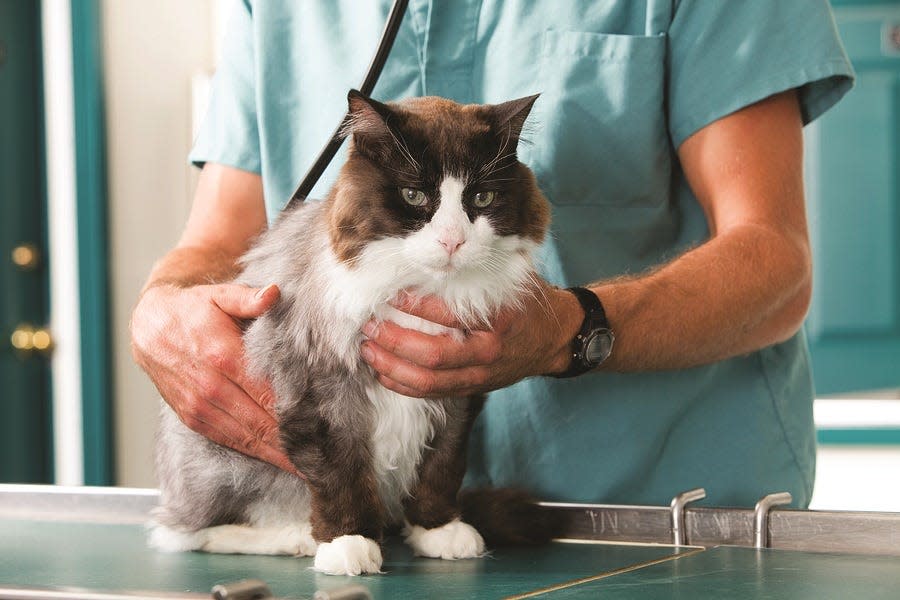Move over dogs, cats are finally getting the health research and treatment they deserve

Sometimes it seems as if dogs get all the attention when it comes to new treatments and research into their health problems, but cats are starting to get some love, too. Two weeks ago, we reported on general takeaways for pet owners from last month's VMX meeting in Orlando, Florida, and this week we're touching on advances in cat care and health.
One of the most exciting is the news that feline infectious peritonitis could soon have an FDA-approved treatment available from veterinarians. When we last reported on FIP (uexpress.com/pets/pet-connection/2020/03/16), medication that worked was available, but it wasn't FDA approved, and it couldn't be prescribed by veterinarians.
"We're anticipating a new medication coming out this year that could be a potential cure for feline infectious peritonitis," says Dana Varble, DVM, chief veterinary officer for the North American Veterinary Community. "Just the idea of a new medication being widely available, approved, knowing that I have something to offer those cats; the thought of being able to help them is really exciting. I'm very, very hopeful that we'll see that medication hit the market in 2023."
If you live with a cat, you are probably aware that cats do their darnedest to hide that they're in pain. Their predatory nature tells them that they'll be at risk from other predators if they appear to be weak, and we don't have a way to communicate that we and their veterinarian have only their best interests at heart.
Veterinarians have grimace scales (felinegrimacescale.com) to help them identify the expressions of cats in pain, but Varble says additional help may become available in the form of a noninvasive device that works with the nervous system to detect pain signals. It has the potential to provide more data-driven information about how to assess pain in cats, she says.
"That could really help us not only address their pain, but also assess how our pain treatments are working. I think that's an even bigger challenge."
A favorite saying among veterinarians who specialize in treating cats is, "Cats aren't little dogs." With that mantra in mind, more medications are being developed specifically for cats, rather than adapting drugs made for dogs or humans. One of them is Bexacat, approved in December by the United States Food and Drug Administration. It's a flavored chewable prescription medication that may improve glycemic control in some cats with diabetes.
Another is Solensia, an injectable monoclonal antibody therapy administered monthly to fight osteoarthritis pain in cats.
In the past, Varble says, medicating cats for pain was usually done on a case-by-case basis, and sometimes the risks could be high.
"Now that we're seeing new medications being developed specifically for cats, those risks go down and the effectiveness of those medications goes up," she says. "We're not relying on human medications or medications introduced through the human medical field and trying to find ways to use them with animals."
Cats are living longer, too. Lifespans of 15 to 20 years aren't uncommon. Veterinary medicine is better able to treat the health problems of cats in this geriatric stage of life, Varble says. She looks forward to cats having not only longer lives, but better lives, with better management of common conditions in senior and geriatric cats, such as kidney disease.
It's becoming clear that cats with kidney disease may be experiencing subclinical nausea, stomach upset and gastrointestinal issues, Varble says. They might be eating enough that they're surviving, but they're not always taking in enough food to thrive.
"I think one of the new things we're going to see very soon are more treatments geared toward controlling that nausea, the GI pathology, the lesions that are associated with kidney disease in cats," Varble says. "Even though we have good foods for them, we can optimize how the body processes those foods. I think we're going to see a lot of medications come out geared toward that as well."
Do you have a pet question? Send it to askpetconnection@gmail.com or visit Facebook.com/DrMartyBecker. Pet Connection is produced by veterinarian Dr. Marty Becker, journalist Kim Campbell Thornton, and dog trainer/behavior consultant Mikkel Becker. ©2023 Andrews McMeel Syndication
This article originally appeared on South Bend Tribune: Pet Connection: New treatments for our feline friends

